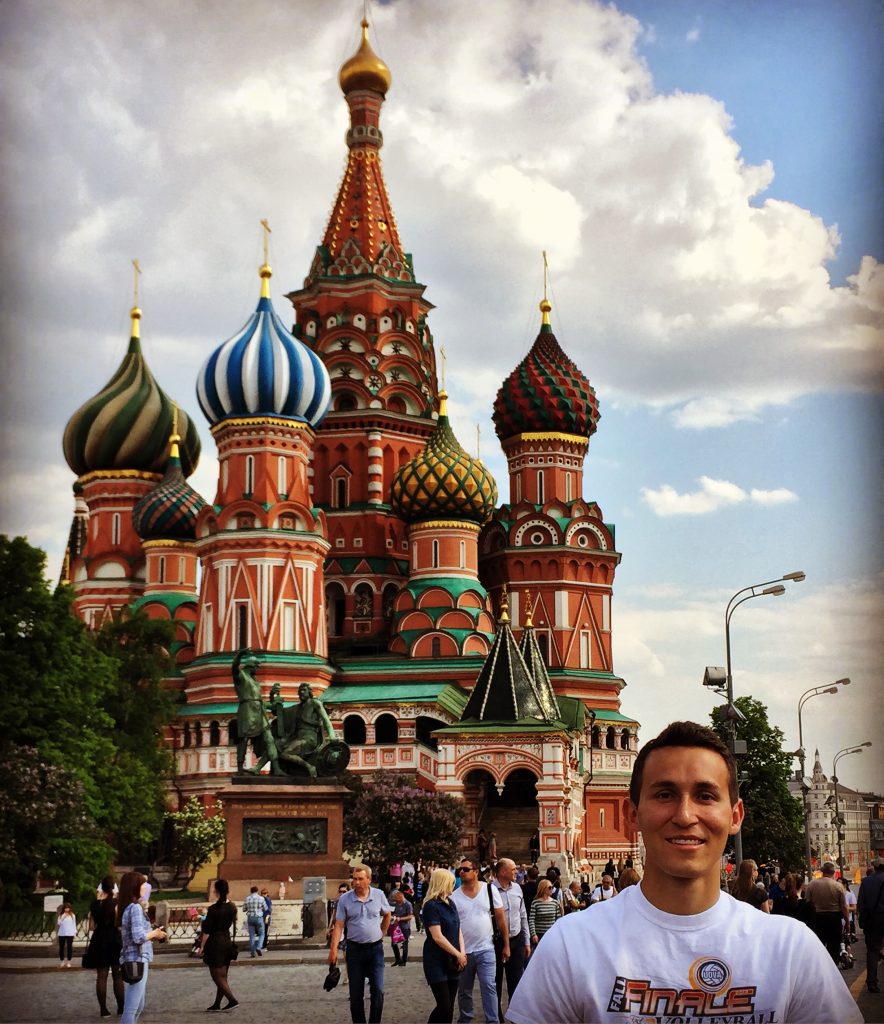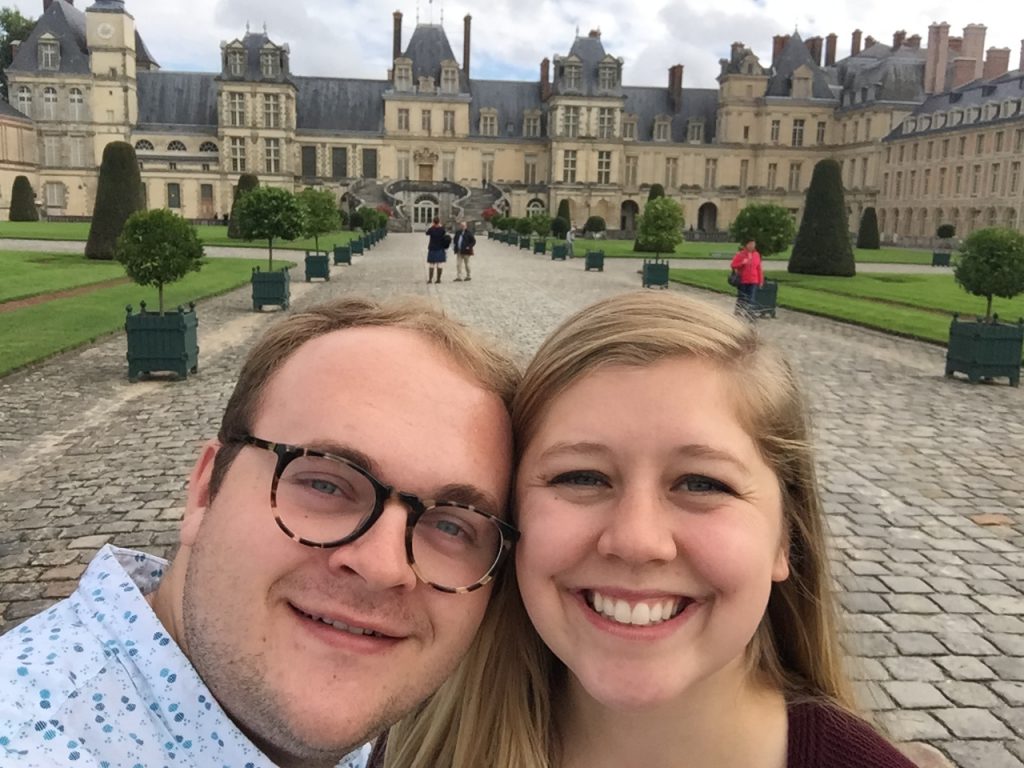The David M. Kennedy Center for International Studies offers a variety of foreign internship experiences. This map indicates in which countries internships are offered, but does not reflect the exact location. (Kaleena McKell and Karenna Meredith)
Working in a foreign country can be exciting and rewarding, according to BYU students and professors, but it does have some challenges. Students and professors shared their experiences working abroad and what one should consider before going.
BYU Russian professor Tony Brown is the director of the Russia, Northern Europe and Eurasia internship programs. Brown helps coordinate internships for students in whatever field they choose and is an advocate for students experiencing international internships.
“Living in another culture has a way of giving one a, perhaps, new and enhanced perspective of their own worldview,” Brown said. “I think it’s important to recognize that there is more than one way to do something.”
The way business meetings are conducted, the way foreign languages are taught or the way archival work in a museum is handled will vary depending on the country. The way Americans do it is one way, but not the only way, according to Brown.
“We tend to have western-based, centric views of time. In countries, such as in Eastern Europe, for example, people view time differently,” Brown said. “Oftentimes productive hours aren’t spent behind a desk in some professions, but over lunch or going to dinner after work. It isn’t necessarily a 9 to 5 regime but a more fluid way of looking at time.”
Brown said returned missionaries at BYU who feel some sort of void upon coming home should consider a foreign internship. He said an internship has the potential to fill that void.
“The call comes — for the most part they respond to it. They learn, grow, come back, and then there is a sort of void, a lack of purpose,” Brown said. “This isn’t about necessarily what an internship could do for you in term of credentials — it will do that — but rather it’s about how you can discover your life call.”
Brown said students ought to go into the internship already having some academic training under their belt. Academic courses can be an important part of preparation and provide a foundation for the actual internship.
In the U.S. there is a deficit of multilingual speakers, according to Brown.
“As the world increasingly becomes flat and multi-national businesses expand and grow, the need for those who can speak and who know how to work with people within those cultures becomes extremely important,” Brown said.
A student is not committing his or herself to a certain profession by participating in an internship, but rather is gaining valuable life experience and skills that can be transferable, according to Brown. Working abroad encourages understanding and compassion for all people, which Brown thinks the world needs more of.

Business management student Brycen Duckworth participated in an internship abroad last year. Duckworth spent three months in Moscow, Russia, last summer and was involved in two separate internships.
His first internship was at a film festival similar to Utah’s Sundance Film Festival, and only lasted a couple of weeks. Duckworth helped with translations because there were a lot of people from France and Belgium who didn’t speak Russian but could speak English.
Duckworth’s second internship was at the American Center at the embassy in Moscow. The American Center allows Russians to come and get a taste of America. American people can present there so Russians can learn more about American culture, and can practice English.
“I helped with a translation club that met once a week, and I also started my own club which was basically teaching English through games,” Duckworth said. “We would meet once a week and play games to learn English.”
The best part of working abroad for Duckworth was experiencing the culture first-hand. He had previously served a mission in Russia where he learned to speak Russian. Missionaries in a foreign country get a taste of the culture, but don’t fully experience it according to Duckworth.
“When you’re there for an internship or study abroad you get to learn the history,” Duckworth said. “You get to interact with the people on a social level, and you get to see what life is really like for a citizen of that country,”
He said the workplace in Moscow was not much different from an American office. The most valuable thing was being able to see Russia from a different perspective and interact with people, according to Duckworth.
“I don’t know if I’d want to work (abroad) for a long period of time, but I wouldn’t mind going for a couple of years and working in the embassy in Moscow or something like that,” Duckworth said.

Nathan Tolman, a junior majoring in French and minoring in music, spent fall semester 2016 working in Paris, France. He worked for a startup incubator, a nonprofit organization that helps businesses get on their feet.
Tolman was involved in organizing and promoting an entrepreneurial festival, which aimed at providing assistance for starting a business. The festival drew many local business owners and students at the local business school. Over 2,000 people came to the event thanks to Tolman and fellow BYU intern Katie Baker’s social media campaign.
The best part of his internship was choosing the experience he wanted based on his interests, Tolman said. The companies his employer was involved with all had different needs.
Tolman said everyone in France takes their job very seriously, even if they aren’t high up on the chain.
“In France they view their job as a privilege, not a right,” Tolman said.
Because of this, the work environment was different than what Tolman had experienced in the states. Tolman said people did not just work for money, but rather they put in time at work, usually 35 hours a week as a maximum, in order to provide for and be with their families.
Work in France is similar to work in the states in many ways, but there are a few differences Tolman pointed out.
He said working in another country is difficult because coworkers used different terminology, and there are different laws to abide by when doing business transactions. At times it was difficult to communicate at the same level of everyone else in the workplace, even though Tolman spoke at an advanced level of French.
Tolman would consider working abroad again if he could make enough money. He said people need to consider where they are working to determine if it’s possible.
“If you’re not a citizen you don’t get social security in France, and they take 50 percent for taxes, so I’d have to be making enough money to live there long term,” Tolman said.
Students can visit the Kennedy Center’s website for more information about foreign internships opportunities.




